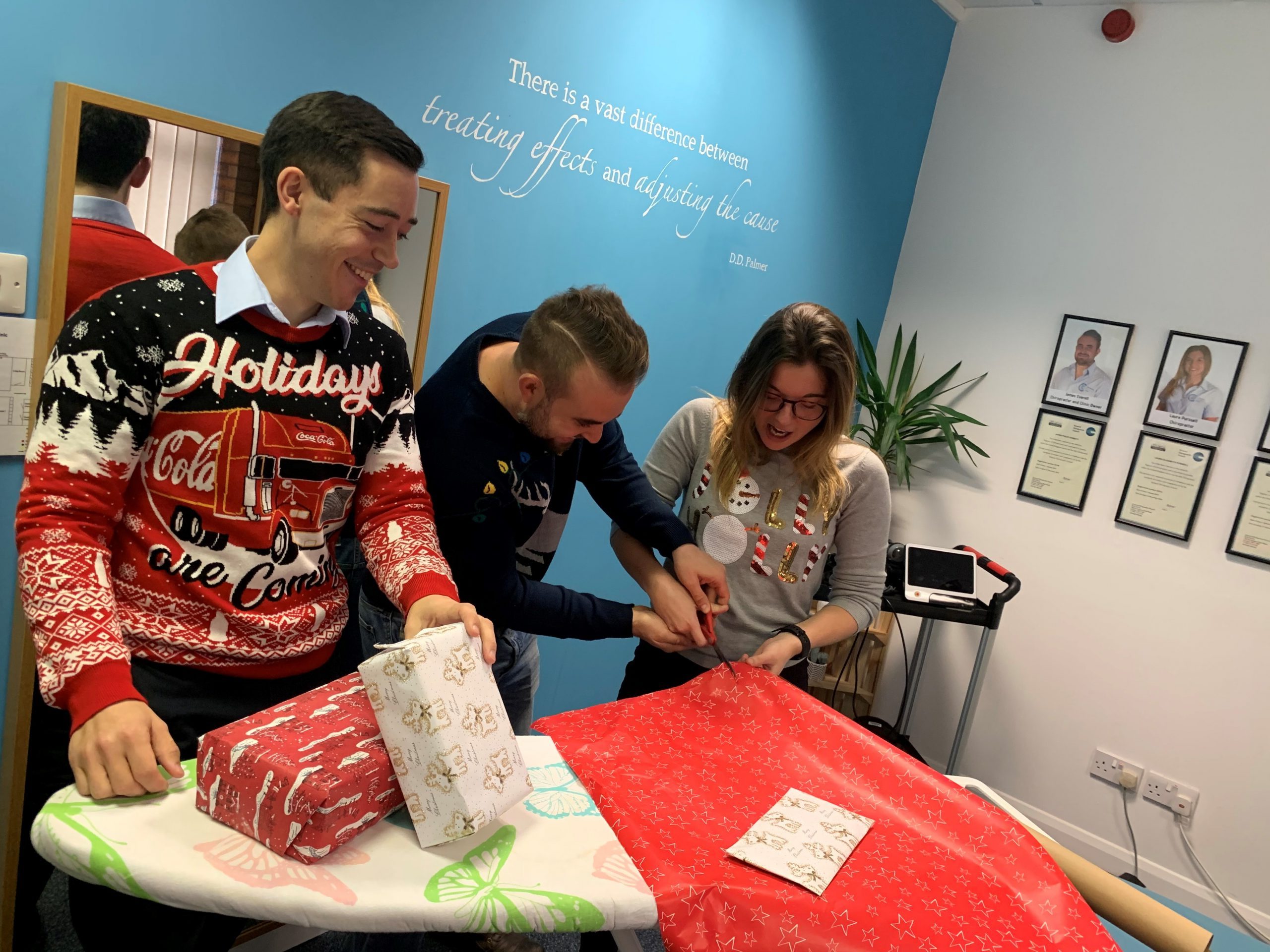What injuries are people most likely to experience during the holiday season and why? Is it the strain of decorating, wrapping presents or carrying shopping bags etc?
All of the above. It is usually when we participate in activities that we are not used to. For example, repetitive activities such as wrapping lots of presents in one single session and being in a static posture whilst wrapping them or even chopping lots of logs for the fire, rather than taking breaks from wrapping or wrapping the presents at different heights e.g. on the floor or on an ironing board or sat at the dining room table, varying the posture and not wrapping 10’s of presents at once is the key, don’t leave all the wrapping to do at the last minute, use festive gift bags for some presents to avoid having to wrap every present. Gently stretch after wrapping if you feel yourself tightening up. Other activities may be lifting loads we are not accustomed to such as lots of shopping bags (affecting the neck and shoulders), a Christmas tree or large heavy Christmas decoration boxes or super-sized turkeys, if you can, share the load with a family member or friend especially with awkward lifts out of a car, through tight doorways or over furniture. When decorating the Christmas tree, avoid straining your back by reaching for the awkwardly placed bauble in the corner or angel on top of the tree, use a stool or ladder if needed to aid you or enlist one of your children to place those hard to reach baubles at the back of the tree. If lifting heavy items, bend both knees, stick your bottom out to use more muscles and make lifting easier, keeping items closer to your body will also make it easier for you.
Do you see an increase in the number of patients coming to you over the holiday season with Christmas-related injuries?
Yes, as well as the activities above that we are usually only used to doing once a year that can affect a variety of spinal muscles and joints, the stress of getting everything organised and on time and rushing around to all the Christmas parties can increase tension in the muscles of the neck and upper back. Another cause of pain around the Christmas period can actually be inactivity; as the days are shorter and we tend to feel more tired around this time of year, we also tend to do less, and feel we have less time to keep active, we tend to sit for longer periods as we are busy watching TV, drinking, eating and being merry. It is important to remember to be active and move your body throughout the Christmas period, and not just on the work Christmas party dancefloor. There is still time to fit a higher level of activity into your day despite the short hours; take the stairs at work, get off the bus at an earlier stop and walk, have a walk at lunchtime instead of sitting at your desk with your lunch. Not to mention participating in sport or recreational activities after work, most likely indoor sports clubs or swimming, or running clubs (with head torches of course). You may find it difficult to fit sports in during the week, however at the weekend many sports clubs have morning events such as local cycling clubs, all which will help to increase your activity and boost your mood. It is a myth that resting will help back pain especially prolonged bed rest which will likely make your back pain worse, gentle, regular movement is the best medicine to help those aches and pains. Plan a gentle walk after Christmas dinner to walk it off. Try to keep alcohol consumption to a minimum to avoid the embarrassing back injuries from falling over during the holiday period.
Have you personally experienced any patients with injuries linked to Christmas activities?
Yes, we often see patients once they have “made it through” the Christmas period or as an emergency just before Christmas as they want to feel better for the big day, some patient sit on it for longer in case it becomes better on its own and we tend to see them in the New Year.
In summary:
You will no doubt be busier in the home in preparation for Christmas. Take regular breaks when doing the housework or cooking. Use a table when preparing food for Christmas dinner rather than standing e.g. for peeling potatoes or vegetables. You will no doubt be watching your fair share of Christmas TV programmes; but make sure to take breaks so you are not sitting around for prolonged periods. Our backs are designed to move and they let us know that if we have been sitting for too long.
If you are going on a long journey to visit your relatives; make sure to take a break to stretch your legs and relieve the tension in your neck and back. Try to share the driving if possible.
If you feel yourself starting to stiffen up, go for a short walk or perform some simple light stretches at home (many stretches for your back can now be found on YouTube or yoga/Pilates apps)
If you are out partying in your heels, take some sensible shoes with you in case your feet, legs, or back start to ache.
Managing stress is very important over the holiday period, remember to carve out time for yourself to relax, take deep breaths, or listen to mindfulness/meditation apps (Headspace, Samten or Calm). Break shopping trips into smaller chunks rather than one big stressful one. Sit back, listen to some Christmas songs and enjoy the fruits of your Christmas decoration labour.
If you feel that you are moulding into the shape of the sofa, rather than the other way around, use a small cushion between the small of your back and the back of the sofa to give you more support and to avoid slumping for long periods.
Christmas shopping; if you can order your presents or Christmas food and drink online to be delivered to your house, this will save you all the excessive carrying that you may not be accustomed to. Remember to take regular breaks rather than spending hours hunched over a laptop looking for potential gifts. If you go shopping, remember to distribute the weight of the bags between both arms. Wrap presents as they arrive rather than wrapping them all last minute.
If you have a lot of washing up to do after Christmas dinner, standing with one foot on a small step in front of the sink, leaning against the sink, or opening the cupboard and placing one foot to rest in the cupboard, can all help ease tension on your back. Prepare some of the Christmas meal the day before.

